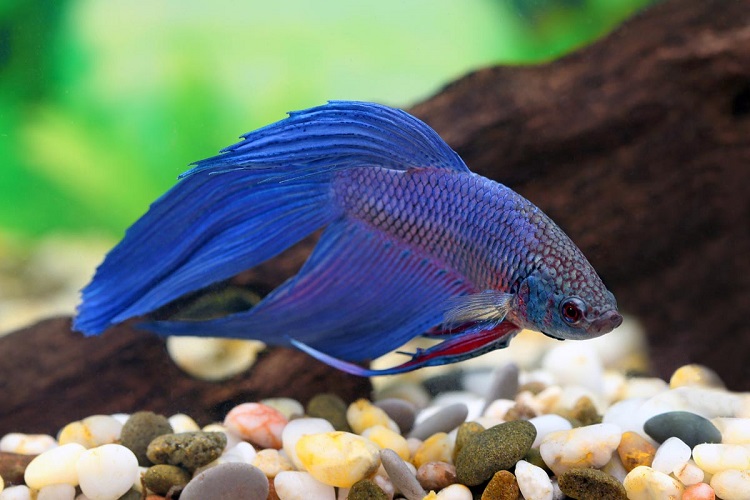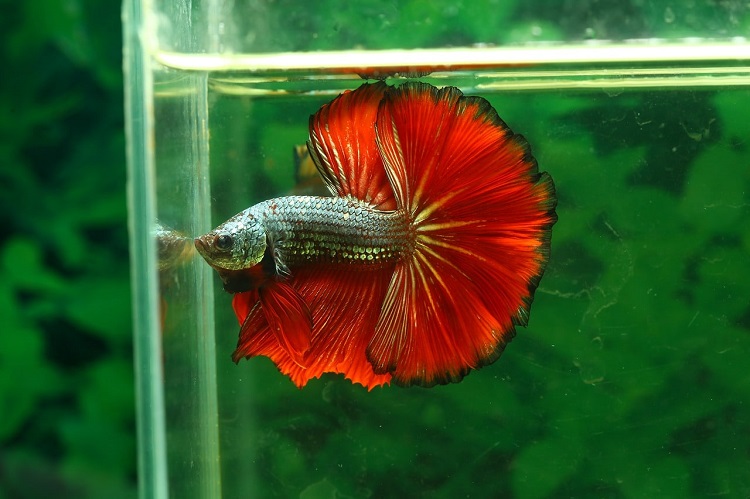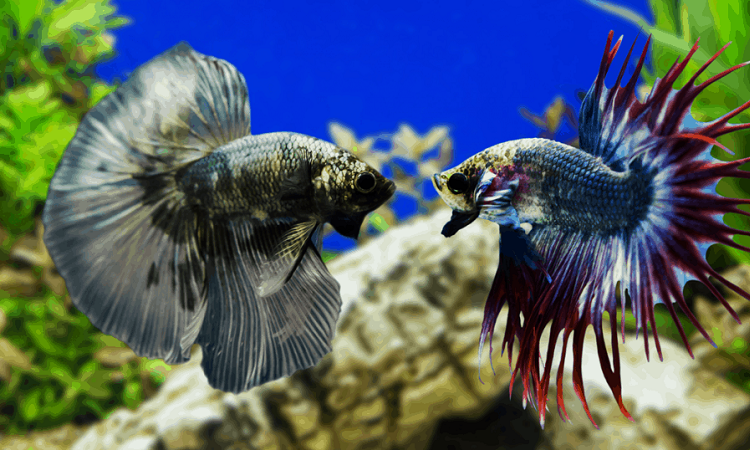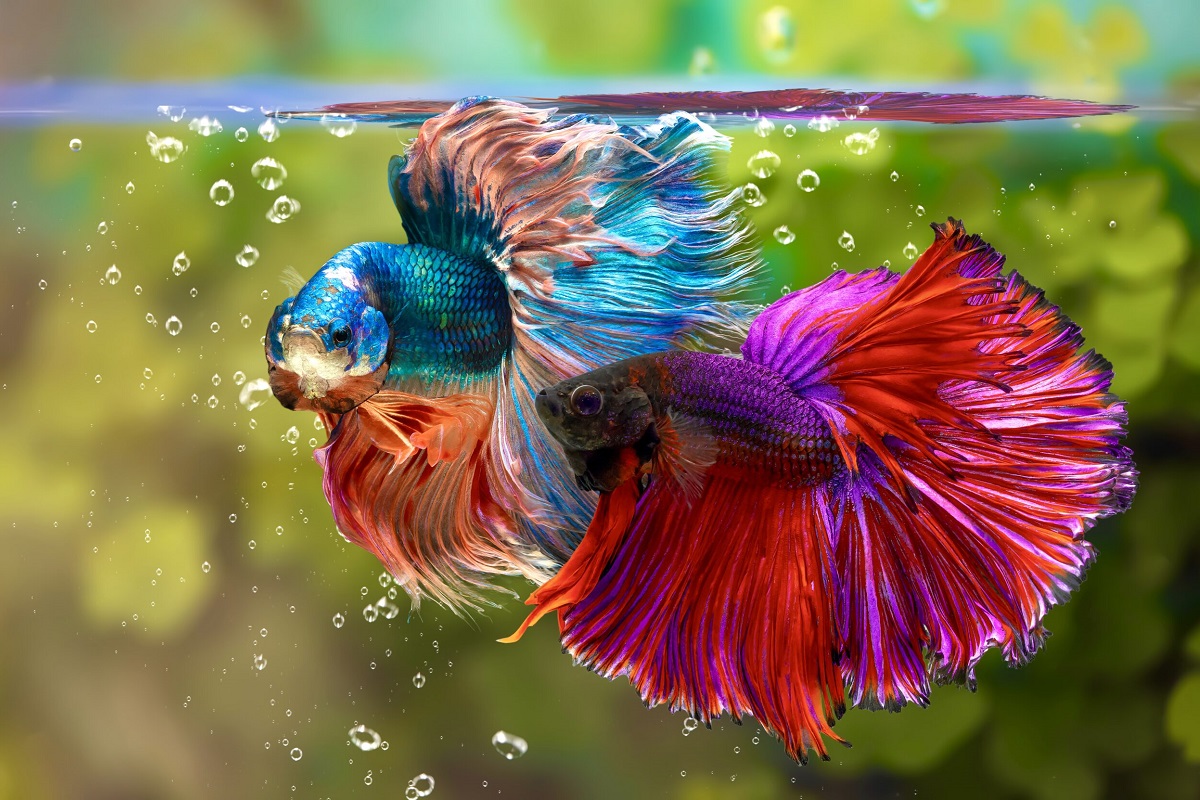Betta fish live for an average of three years. However, there is no guarantee that you’ll be able to have your Betta for so long. Why?
When a Betta is purchased from a pet store, it is already one year old.
Males, in particular, are sold once they mature to their fullest potential, resulting in fully developed fins and hues.
Females, on the other hand, can be sold as young as six months old.
Buying a healthy, young betta fish from a reputable pet store is one of the most important things you can do to extend the time you spend with your betta.
You should watch for signs of unhealthy fish like sharp-edged fins, bloodshot eyes, or bulging outward. Also, a healthy Betta fish will respond by swimming once you touch the tank.
Are there any ways to assist these Siamese fighting fish live longer and healthier lives? Here’s everything you need to know.
Contents
Betta Fish Lifespan

As stated at the very beginning, the average lifespan of a betta fish is three years. Even though male bettas have the same lifetime as their female counterparts, they often die first.
Male bettas in captivity can live up to five times as long as their wild counterparts if properly cared for. In fact, there have been reports of bettas in captivity living for ten years or more.
There is no comparison between a betta’s natural habitat and a fish tank. Factors like natural predators and access to food contribute to the low likelihood of Betta fish surviving for a long period of time in the wild.
Of course, you can’t extend the lifespan of a Betta fish just by pulling it out of the wild. You must ensure that you feed it correctly, put it in a tank that’s not too small, and prevent it from fighting with other fish.
Causes of Early Death to Betta Fish
Small, unfiltered bowls make chronic ammonia poisoning a prime killer of bettas. Bacterial infections from poor water also cut lives short for betta fish. Overfeeding leads to permanent bloating and organ damage.
Old age isn’t the only cause of dropsy—it often signals an underlying condition. Jumping from tanks, getting sucked into filter intakes, or curious pets can accidentally injure betta fish leading to their death.
Aggression from inappropriate tankmates like fin-nipping tetras has tragic results. Illness or birth defects related to irresponsible breeding and genetics hinder health.
Tips to Help Your Betta Fish Live Longer
Below, we’ll look in detail at some of the most important things you can do to help your Betta fish live a longer and healthier life.
Water Quality and Space

A fish tank can make a Betta’s life much more comfortable and stress-free. But these species cannot grow and develop in a small place, such as a bottle.
They need at least two cubic feet of space in the aquarium to sustain their health.
To remain safe, always remember that Bettas are fiercely protective of their territory and will act aggressively if they feel threatened or violated.
As a result, having enough space is critical; a larger tank is preferable.
Second, fish of all species need clean water to grow. As a betta owner, you should ensure that the water is clean but not sterile. If you’re wondering, then let me explain.
A lack of helpful bacteria makes it impossible for fish to sustain good health in sterile or pure water. These “good” bacteria are essential to fish health.
Try adding some real live plants to the aquarium to keep your Betta fish happy and content. In addition to improving water quality, the presence of plants makes the environment more hospitable to fish.
For the sake of your fish, it’s essential to keep an eye out for any water changes that could affect their internal systems when you undertake a water change.
Remove 10 to 15% of the water at a time and then top it off with fresh water before moving on. Fish would have a tough time adapting to such a short period if this approach was used, which is why this method is useful.
Dietary Variety
While betta pellets make a good staple food, provide variety too. Frozen or live brine shrimp, daphnia, and bloodworms give essential protein and nutrients. Blanched vegetables like zucchini or spinach supplement their diet a few times a week.
Offer a rotation of foods to prevent boredom. Fast your betta for 1 day a week to aid digestion. The key is providing balanced nutrition through diverse foods. This helps bettas avoid disease, maintain energy levels, and live up to their genetic potential lifespan.
Ideal Tank Conditions
When it comes to betta health, the tank environment is crucial. Bettas need at least 5-10 gallons of space, with larger tanks of 10+ gallons ideal. The water should be kept between 78-82°F and be free of ammonia, nitrites, and high nitrates.
A pH between 6.8-7.5 provides the right water chemistry. Low-flow filtration and regular partial water changes are a must. Live plants help mimic the natural environment bettas evolved in.
Ultimately, closely monitoring water parameters and providing the proper tank size and conditions will support your betta’s health and long lifespan.
Proper Nutrition
Bettas have specific nutritional requirements. The majority of fish are happy to eat fish flakes, but bettas prefer special fish food pellets.
Prey for Bettas in the wild is generally in the form of small insects. So, these pellets were created to meet their unique and often contradictory dietary needs.
In addition, some veterinarians advocate supplementing their diets with vitamins, which can be beneficial. Including the following foods in their meal is strongly encouraged:
- Brine shrimp
- Mosquito larvae
- Freeze-dried tubifex worms
- Bloodworms
Quickly Identify Signs of Illness
Knowing the symptoms of common betta diseases allows quick treatment which potentially extends your betta fish lifespan. Lethargy, loss of appetite, bloating, fin clamping, labored breathing, white spots, reddening, and eye cloudiness are potential signs of illness.
Bacterial infections like fin rot are treated with antibiotics. Fungal issues respond to antifungal remedies. Parasitic infestations are tackled with medications that kill parasites safely. However, optimal water quality and reducing stressors like overcrowding help bettas avoid disease in the first place.
When caught early, many conditions are treatable if the proper medications are used correctly. But prevention through proper care is ideal to guarantee long bettas lifespan.
Select the Best Tankmates
Certain tankmates can liven up a betta’s environment. Bottom-dwellers like corydoras catfish and small tetra species generally coexist peacefully with bettas. Nerite snails, ghost shrimp, and African dwarf frogs make interesting additions.

Introduce any new tankmates slowly and provide hiding spaces.
Never add fin-nipping species like tiger barbs that will bully bettas. Overcrowding stresses bettas, so keep schools of tetras or rasboras under 6-8 individuals.
Preventing Fights Between Male Betta Fish

Betta fish prefer to be left alone, and it is general knowledge that they will attack anything they see as a threat. As a result, they are usually bred in isolation in their tanks.
If you want to keep them company, it would be wise to learn about other fish that won’t cause anxiety or provoke your Betta. Corydoras, for instance, make excellent companions for your Betta.
They aren’t bothersome, and the fighting fish won’t mind them either. Avoiding fish with bright colors and long fins and tails is best.
If the Bettas think the other guy is a rival for their attention, they may attack you. If that happens, you’ll have an ailment in the tank.
According to recommendations, male Bettas should be kept in separate tanks, one per container. It would also be ideal if they never ran into each other or were otherwise noticeable to one another.
Finally, finding a place to hide is typical among aquatic creatures. So, stock your aquarium with either genuine or fake plants so the fish can feel safe.
It’s also a good idea to keep other household pets like dogs and cats away from the Bettas because they can become stressed out if they see them.
Remember, Betta fish can easily experience stress and anxiety due to their surroundings.
Frequently Asked Questions
What is the average Siamese fighting fish lifespan?
Are you curious about how long do betta fish live? Well, with proper care, your Siamese fighting fish lifespan can extend to 2-4 years on average. However, their lifespan depends on factors like genetics, diet, tank conditions, and disease prevention.
How Long Do Betta Fish Live in Captivity?
Betta fish are a popular aquarium fish kept by hobbyists around the world. If cared for properly, betta fish can live for 2-4 years in captivity.
Closing Thoughts
Ultimately, Betta fish are most likely to die due to a physical fight between them. If you can manage to prevent it, you can enjoy the company of your Betta for a long time.
Well-taken care of Betta can live up to six years.
Veterinarians recommend a stress-free environment, an immaculate tank, healthy food, and regular medical exams.
If you are a responsible owner and follow that advice, your Betta will live a long and happy life.

Ian Sterling, founder of Fishlab.com, began his aquarium journey over 30 years ago, driven by a deep fascination for fish and their diverse personalities. His website, Fishlab.com, is dedicated to making fishkeeping accessible and enjoyable, offering beginner-friendly guidance, expert insights, and a community for aquarists to connect and share experiences.


